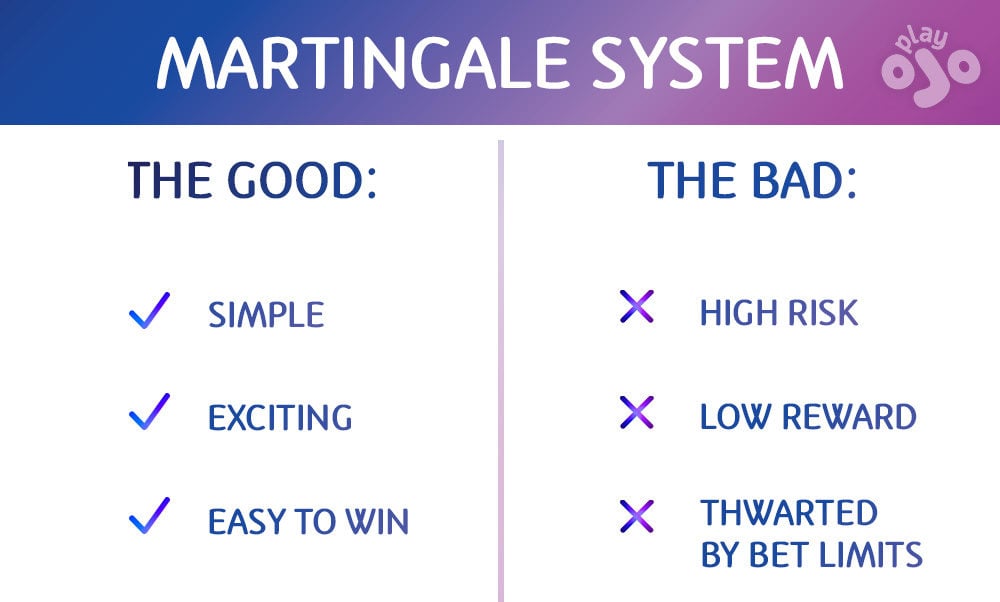When it comes to betting strategies, none are more famous than the Martingale system.
For over 100 years, gamblers have used it to try and make their fortune. But although it looks promising on paper, is it really the secret to beating the wheel?
The Martingale strategy is incredibly popular with roulette players who are looking for a winning system, because it’s perfect for even money bets like red or black.
I’m going to explain how this system works and give you my own take, based on years of experience using this system at the casino table and beyond.
The rules of Martingale
The best-known of all roulette strategies, Martingale is a notorious system that casinos neutralized many years with one simple change to the rules. In a nutshell, the Martingale betting system involves doubling your bet when you lose.
If you’re looking to use the Martingale strategy in roulette, even money bets will be the tools of your trade, because Martingale only works with bets that have a 1 to 1 payout. Those bets include red, black, odd, even, high and low.

Although I suggest you avoid this like the plague, it’s still useful to know how the Martingale betting systems works and why it’s destined to fail.
Here are the basic rules of the Martingale roulette strategy:
- Bet only on even money bets such as red or black, odd or even, high or low
- Bet 1 unit to start with
- Stick with 1 unit when you win
- Double your bet if you lose
- Once you’ve won, revert to 1 unit and repeat
Martingale bet sizes
The simplest and most important rule of this roulette system is the increase in bet size.
Here’s the sequence of bets, starting at £1. Start at anything bigger than £1 and you can see how big a bankroll you’ll need!

The odds of winning & losing streaks
Martingale is totally reliant on win and loss streaks, so it’s worth looking at the math behind roulette to see how likely you are to run into catastrophic losing streaks, and what the financial consequences would be.
For the sake of roundness, let’s consider a streak of 10 reds on the trot.
The odds of winning any even money bet in European roulette are 18 in 37 or 48.64%. The odds of losing an even money bet are 19 in 37 or 51.35%. Multiply those by the power of 10, and we get the odds of that outcome happening 10 times in a row.
Odds | Percentage | Profit/Loss (£1 unit) | |
10 Consecutive Wins | 1 in 1,346 | 0.074% | £10 |
10 Consecutive Losses | 1 in 784 | 0.127% | -£1,023 |
Because zero is also a loss when betting on red, you’re almost twice as likely to hit a 10-spin losing streak as to hit 10 wins in a row, and the difference in profit or loss is striking.
If you try this system 1,500 times (although admittedly that would take you a while, require a LOT of cash, and be completely bonkers), you would suffer 10 losses in a row around twice on average, and enjoy 10 wins in a row just once. And your reds in a row will net you just £10.
If that doesn’t discourage you from trying this system, nothing will!
Martingale examples
How does the Martingale betting strategy work in practice? Here’s a couple of examples of when it works, and when it doesn’t! Just be aware that Martingale will “work” (i.e. be successful in winning 1 unit) the large majority of the time, and fail only once in a while. But when it does fail, it fails spectacularly and wipes out any previous (and future!) gains.
When things go well
The mission of the Martingale betting system is simple: Win a single bet, then start again. Here’s a typical game sequence using a £10 starting bet. Our goal is to bank 2 wins and come away £20 better off.
Bet | Stake | Result | Running profit |
#1 | £10 | Lose | -£10 |
#2 | £20 | Win | £10 |
#3 | £10 | Lose | £0 |
#4 | £20 | Lose | -£20 |
#5 | £40 | Win | £20 |
When things go badly
On average, you will only lose an even money roulette bets 5 times in a row about once in 28 attempts. That means that most of the time then, you won’t need to bet as much as 32 units before you get a win.
But every so often, you’ll encounter losing streaks so bad that you either run out of money, or reach the table maximum. In this example, we’re betting £1 unit stakes on black at a roulette table with a £100 maximum bet.
Bet | Stake | Result | Running profit |
#1 | £1 | Lose | -£1 |
#2 | £2 | Lose | -£3 |
#3 | £4 | Lose | -£7 |
#4 | £8 | Lose | -£15 |
#5 | £16 | Lose | -£31 |
#6 | £32 | Lose | -£63 |
#7 | £64 | Lose | -£127 |
#8 | £128 | Lose | -£255 |
Disaster strikes, and after 7 reds in a row, we can’t place our next bet of £128 as we have exceeded the table maximum.
If we bet the £100 max, we break the mathematical model, because even if we win, we still show a loss of £27 overall. Note that after 7 losses, we would have to stake 128 units to make a 1-unit profit!
At a European roulette table, the chances of red or green appearing 7 times in a row are only 1 in 106. In American roulette, your chances of losing 7 times in a row increase to 1 in 92.
If you use the Martingale model often, you are virtually guaranteed to encounter a string of losses which causes the system to fail. At tables with relatively low maximum bets, it’s game over for Martingale.
My sensible version of Martingale
In its purest form, the Martingale betting strategy is fine when tackling very short term variance, but it’s totally unsuitable for longer sessions. With a tweak here and there, we can make Martingale just as enjoyable but slightly less catastrophic!
- Pick a goal and stick to it: Don’t be greedy. Have a modest profit target in mind and leave once you’ve achieved it.
- Limit your losses: OK, it’s against the rules to stop when the next bet is just too big, but better to stop at an affordable number (e.g. the 32-unit bet after a 5th loss) than lose your bankroll or hit the table max.
- Play longer odds bets: Try Martingale with a column or dozen bet, and increase your bet by a third (or even a quarter) if you lose.
Pros and cons
We’ve learned the rules and seen it in action, so we know why it’s become so popular with players who believe they’ve discovered how to win, and we also know why it is doomed to fail. But here’s a quick rundown of the pros and cons of the world’s most famous roulette system.

Strengths
The pros of Martingale is always a short list!
But alongside the many downsides to Martingale, there are a few redeeming features:
- Simplicity: With just 1 rule, Martingale is incredibly easy to learn, remember and implement. Systems don’t come simpler.
- Excitement: You can’t deny that a roulette system that starts with a small bet and quickly reaches a bet 128 times as big will be pretty entertaining.
- Short-term success: Players who use this method will win a few units more often than not.
By sticking to even money bets, Martingale puts itself in a position to win frequently, even if the amount that wins matters more.
Weaknesses
Although I’ve identified a similar number of weakness as strengths, they’re not all equal, and when it comes to the cons of the Martingale betting system, its flaws are fatal.
- It’s expensive: Even without a table maximum, you need thousands of unit bets to ensure you can continue deep into a string of losses.
- Table limits get in the way: Casinos don’t need to take risks by accepting big bets on black or red, and they certainly don’t want you using a system which works in theory. A maximum bet limit is the death blow to the Martingale method.
- Gamblers’ intuition: Most gamblers are way off the mark when it comes to predicting the risk of multiple events happening. Martingale roulette players also believe the frequent small wins will build their bankroll quickly enough to cope with the occasional big loss. In reality, the big losses are bigger and more frequent than they think.
- High risk, low reward: Martingale is sometimes likened to picking up pennies in front of a steamroller. It’s relatively easy and stress free to pick up pennies (in our case 1 unit) until you get crushed and lose it all.
This is very much the experience of most players who have tried Martingale, and from my own painful experience too! Unless you stop once you’re in profit, huge losses are virtually guaranteed.
Conclusion
The popularity of Martingale may come down to gamblers thinking that a catastrophic string of losses is far less likely than it really is. As I’ve shown many times, it only takes a few reds in a row to bust your bankroll and wipe out the profit from literally hundreds of previous attempts. An extremely risky strategy which involves betting big and winning small is not one I’d recommend, whether it’s for roulette, blackjack or sports betting.
There are many other roulette systems with less perilous models such as d’Alembert or Paroli, and I suggest you explore those instead. If you still want to give Martingale a spin, use a freeplay roulette online casino game.
FAQ
It can do under a very specific set of circumstances where you have an infinite bankroll and no maximum table bet. In that scenario, you can simply play until you get a win. Under the rules of roulette probability, you are extremely likely to spin red within 30 spins, and there are no known instances of a roulette wheel ever spinning more than 32 of the same even money bet in a row. But – and it is a colossal and conclusive but – no one has infinite wealth, no casino would accept such huge bets, and you won’t find a roulette table with no maximum bet. So while in theory Martingale is an answer to the question of how to play roulette profitably, in practice there are no scenarios where it is possible in the long run.
No. We’ve already seen how casino restrictions have neutralised any advantage the player may have by using the Martingale strategy, and we should also bear in mind that the Martingale method does not affect the house edge. There’s no escaping the fact that even with an invaluable roulette guide, a game of pure luck with an in-built edge is impossible to beat, without some sort of psychic powers.
You can keep doubling – but only to a point. The table limits for even money bets are often higher than bets such as single number with bigger odds, but table minimums are often higher for black or red too. So while there are no rules to stop you doubling your bet in roulette whether you win or lose, every roulette table has a maximum bet and once you reach that, the croupier will tell you to stop.
Yes, in fact most land-based casinos love it. Any player who comes into a casino armed with betting strategies like a roulette system will be given a warm welcome. I never recommend using a system, and one of the reasons for that is that casino games are for entertainment, and they’re not meant to be a way to earn money. Sure, anyone can win in the short term if the right roulette wheel numbers come in, but the house edge prevents you from winning consistently. In games of chances, systems do not win, and generally should be avoided except where they increase the fun factor without increasing the risk of losses.
Martingale was first mentioned in France during the 18th century and although it was used in roulette, it has since been applied to many different gambling games with low-odds bet types. Rumour has it, legendary gambler Charles Deville Wells used the Martingale method to win huge sums from casinos in Monte Carlo, although there is no proof of this and he remains no more than a mythical Martingale roulette success story.
Martingale is a ‘negative progression’ model which involves betting more when you lose. Anti-Martingale is the opposite, a positive progression model where you increase your bets when you win, and decrease them when you lose. Although it’s no more profitable than Martingale, it is popular in financial trading as unlike games of pure chance, the outcomes are not always independent. If you’re interested in anti-Martingale strategies, the Paroli roulette system is a good place to start.


















